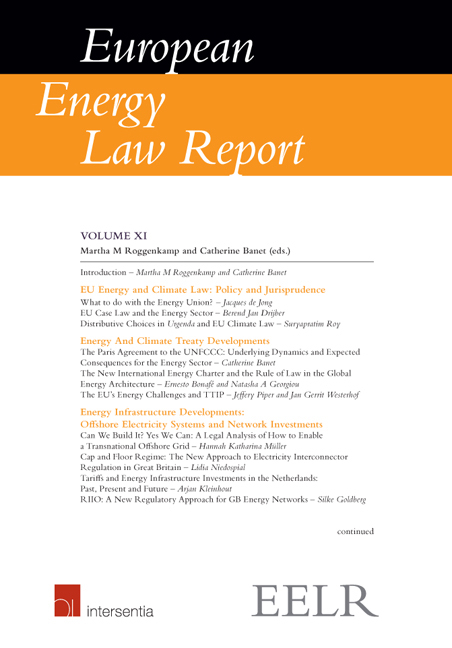Book contents
- Frontmatter
- Editorial
- Contents
- List of Abbreviations
- List of Contributors
- Introduction
- Part I EU Energy and Climate Law: Policy and Jurisprudence
- Chapter I What to do with the Energy Union?
- Chapter II EU Case Law and the Energy Sector
- Chapter III Distributive Choices in Urgenda and EU Climate Law
- Part II Energy and Climate Treaty Developments
- Part III Energy Infrastructure Developments: Offshore Electricity Systems and Network Investments
- Part IV Heat Supply Legislation in the Eu
- Part V Security of Energy Supply and Safety
Chapter II - EU Case Law and the Energy Sector
from Part I - EU Energy and Climate Law: Policy and Jurisprudence
Published online by Cambridge University Press: 29 September 2018
- Frontmatter
- Editorial
- Contents
- List of Abbreviations
- List of Contributors
- Introduction
- Part I EU Energy and Climate Law: Policy and Jurisprudence
- Chapter I What to do with the Energy Union?
- Chapter II EU Case Law and the Energy Sector
- Chapter III Distributive Choices in Urgenda and EU Climate Law
- Part II Energy and Climate Treaty Developments
- Part III Energy Infrastructure Developments: Offshore Electricity Systems and Network Investments
- Part IV Heat Supply Legislation in the Eu
- Part V Security of Energy Supply and Safety
Summary
INTRODUCTION
An overview of the case law of the EU Courts in Luxembourg in the energy sector looks like a patchwork. There is by definition no one overarching theme since all depends on which cases are submitted to the Courts in the relevant period. Some cases involve institutional matters. Sector specialists need to be aware of the importance of the EU institutional framework and the general rules and principles of EU law, since these principles apply regardless of the industry sector and therefore also apply to the energy sector. Other cases relate very much to sector-specific issues, such as disputes concerning the EU Emissions Trading System (ETS).
Traditionally, most cases concern requests for a preliminary ruling from a national court to the European Court of Justice (known as the ‘ECJ’ or ‘the Court ’) about the interpretation or the validity of a provision of EU law (Article 267 of the Treaty on the Functioning of the European Union (TFEU)). Other cases involve direct appeals by companies against a decision of the Commission (Article 263, 4th paragraph TFEU). Member States may also directly challenge other binding measures, such as regulations or directives (Article 263(1) TFEU). Such appeals must be brought before the General Court, which hears all direct appeals at first instance. A last category of cases are infringement proceedings brought by the Commission, in its role of ‘ guardian of the Treaty’, against one or more Member States (Article 258, 2nd paragraph TFEU). These cases are exclusively brought before the ECJ. The ECJ also hears appeals against rulings of the General Court, but only on points of law (Article 256(1), 2nd paragraph TFEU).
Case law is always somewhat lagging behind policy. New policies are laid down in legislative measures and it is only after a while that these new measures start generating legal disputes, some of which may end up in the ECJ. An increasing number of cases feature issues that mark the transition to renewable energy sources, such as the compatibility of subsidy schemes with the EU state aid rules, and the compatibility of schemes on guarantees of origin with EU legislation and with the fundamental freedoms enshrined in the TFEU.
- Type
- Chapter
- Information
- European Energy Law Report XI , pp. 29 - 46Publisher: IntersentiaPrint publication year: 2017

